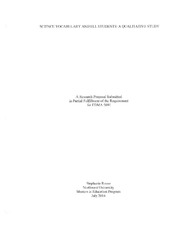| dc.contributor.author | Rouse, Stephanie | en |
| dc.date.accessioned | 2017-10-02T22:34:36Z | |
| dc.date.available | 2017-10-02T22:34:36Z | |
| dc.date.issued | 2014-07 | en |
| dc.identifier.uri | archives.northwestu.edu/handle/nu/25700 | |
| dc.description.abstract | Vocabulary acquisition is a multi-faceted process in any language. Truly knowing a word is incredibly complex in nature (Richards, 1976). When two of my ELL students appeared unengaged in science, I questioned the role of scientific vocabulary in their ability to participate. Specifically, how did academic science vocabulary affect mastery of third grade science concepts for my two third grade ELL students? Though primarily a qualitative study, data was collected through mixed methods of observations, interviews, and assessments. Results revealed factors besides vocabulary to consider, such as learning preferences, scholastic background, family involvement, and having basic needs met. While academic content vocabulary is a gap to be filled for ELL students, there may be deeper issues and needs to be met first. | en |
| dc.format.extent | iii, 55 pages | en |
| dc.format.medium | PDF | en |
| dc.language.iso | en | en |
| dc.publisher | Northwest University | en |
| dc.rights | This original work is protected by copyright. Copyright is retained by the author(s). Works may be viewed, downloaded, or printed, but not reproduced or distributed without author(s) permission. | en |
| dc.rights.uri | http://archives.northwestu.edu/page/copyright | en |
| dc.subject | English Language Learner (ELL) | en |
| dc.title | Science Vocabulary and ELL Students: a Qualitative Study | en |
| thesis.degree.name | Master of Education | en |
| thesis.degree.level | Masters | en |
| thesis.degree.grantor | Northwest University | en |
| thesis.degree.discipline | College of Education | en |


 Maintained by the Northwest University Library
Maintained by the Northwest University Library